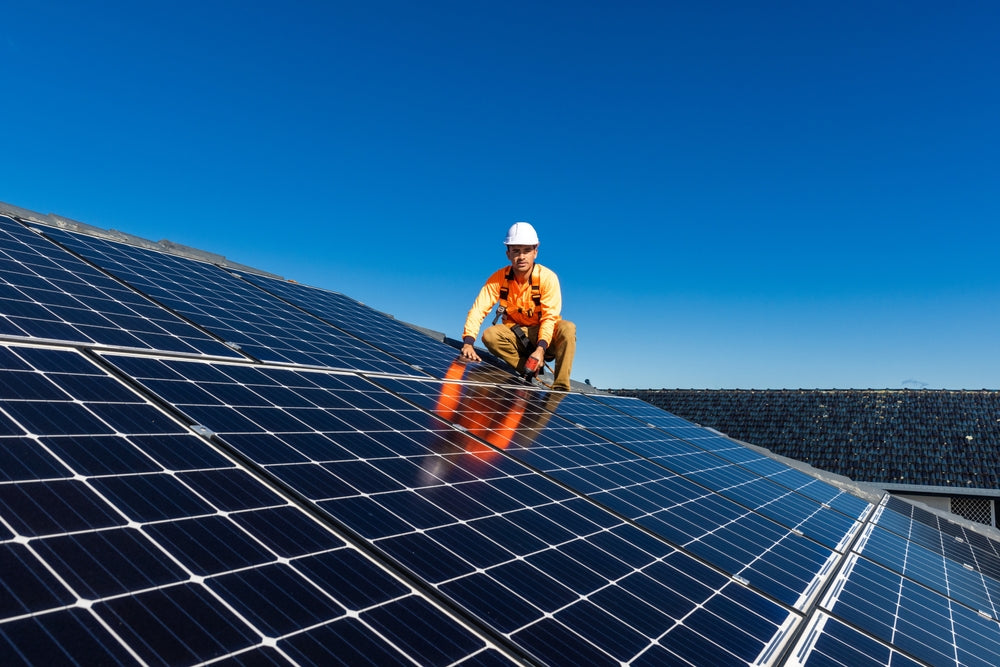
In a world increasingly focused on sustainability and reducing carbon footprints, solar energy has emerged as a game-changer. The advantages of solar panels are numerous, making them an attractive option for both residential and commercial purposes.
Solar panels harness the sun's energy, converting it into electricity and offering a renewable, eco-friendly power source. As energy needs continue to grow and the impact of fossil fuels becomes more apparent, the adoption of solar panels is not just a trend but a necessity.
In Pakistan, the push towards renewable energy is gaining momentum, with local brands like PowerHouseExpress leading the charge. For consumers interested in adopting solar energy, understanding solar panel prices in Pakistan is crucial, as it helps determine the feasibility and return on investment. PowerHouse has become synonymous with quality and reliability in the solar industry, offering a wide range of solar solutions tailored to the needs of Pakistani consumers.
Let’s explore the advantages of a solar panel and see how PowerHouseExpress is playing a vital role in revolutionizing the energy landscape in Pakistan.
PowerHouseExpress: Leading the Solar Revolution in Pakistan
PowerHouseExpress is a pioneering Pakistani brand that specializes in solar energy solutions. The brand has earned a reputation for its high-quality solar panels, inverters, and complete solar systems that cater to both urban and rural areas.
One of the key advantages of a solar panel from PowerHouseExpress is the reliability and durability it offers. These panels are designed to withstand harsh weather conditions, ensuring consistent energy production even in challenging environments.
Another advantage of choosing PowerHouseExpress is the brand's commitment to customer satisfaction. PowerHouseExpress provides comprehensive support, from consultation to installation and after-sales service, making it easier for consumers to switch to solar energy.
The brand also offers flexible financing options, making solar energy accessible to a broader audience. By choosing PowerHouse, consumers are not only investing in a high-quality product but also contributing to a greener, more sustainable future.
The Advantages of a Solar Panel
1. Cost Savings
One of the most significant advantages of a solar panel is the potential for substantial cost savings. Once installed, solar panels can significantly reduce or even eliminate your electricity bills. While the initial investment may seem high, the long-term savings are considerable.
In Pakistan, where energy costs are continually rising, investing in solar panels can be a wise financial decision. Over time, the cost of electricity from traditional sources can add up, but with solar panels, you can generate your electricity for free. This not only helps in reducing monthly expenses but also offers protection against future energy price hikes.
2. Environmental Benefits
The environmental advantages of a solar panel are among the most compelling reasons to make the switch. Solar panels generate clean, renewable energy, reducing the need for electricity produced from fossil fuels like coal and natural gas.
This leads to a significant reduction in greenhouse gas emissions, which are the primary contributors to global warming and climate change. By using solar energy, you are reducing your carbon footprint and contributing to a healthier planet.
3. Energy Independence
Another advantage of a solar panel is the increased energy independence it offers. With a solar power system, you are less reliant on the national grid or electricity providers. This independence is particularly beneficial in areas where power outages are frequent.
In Pakistan, where load-shedding is a common issue, having a solar power system ensures a continuous supply of electricity, providing peace of mind and uninterrupted power for homes and businesses.
4. Low Maintenance Costs
Solar panels require minimal maintenance, which is another key advantage. Once installed, they need little attention apart from occasional cleaning to remove dust and debris that might reduce efficiency.
Most solar panels come with long warranties, often 20-25 years, which means that they will continue to produce electricity for a long time with minimal upkeep. The low maintenance costs add to the overall cost-effectiveness of solar panels, making them a hassle-free energy solution.
5. Increased Property Value
Installing solar panels can increase the value of your property, which is another significant advantage. Homes equipped with solar energy systems are often valued higher than those without. Potential buyers recognize the benefits of lower energy bills and the environmental impact of solar panels, making properties with solar systems more attractive.
This can be a key selling point if you decide to sell your home in the future, providing a return on your investment beyond just the savings on energy bills.
6. Government Incentives and Rebates
In many countries, including Pakistan, the government offers incentives and rebates to encourage the adoption of solar energy. These incentives can significantly reduce the initial cost of installation, making solar panels more affordable.
The availability of such incentives is one of the major advantages of a solar panel, as it reduces the payback period and makes solar energy a more viable option for homeowners and businesses alike.
7. Scalability and Flexibility
Solar panels offer a high degree of scalability and flexibility, making them suitable for a wide range of applications. Whether you want to power a small home or a large industrial facility, solar energy systems can be customized to meet your specific needs.
This flexibility is one of the key advantages of a solar panel, as it allows for future expansion if your energy needs grow. You can start with a small system and add more panels as required, ensuring that your investment can grow with your energy demands.
8. Technological Advancements
The rapid pace of technological advancements is continually improving the efficiency and affordability of solar panels. New materials and designs are making solar panels more efficient, allowing them to generate more electricity from the same amount of sunlight.
Additionally, advancements in battery storage technology mean that excess energy produced during the day can be stored for use at night, further increasing the advantages of a solar panel. These technological innovations are making solar energy more accessible and practical for a broader range of consumers.
9. Positive Impact on the Local Economy
The adoption of solar energy has a positive impact on the local economy, which is another advantage of a solar panel. By choosing solar energy, you are supporting the growth of the local solar industry, creating jobs, and fostering economic development.
In Pakistan, where the energy sector plays a crucial role in the economy, the growth of the solar industry is helping to create new opportunities and reduce the country’s dependence on imported fossil fuels.
10. Long-Term Investment
Finally, solar panels represent a long-term investment that pays off over time. Unlike other energy sources that may fluctuate in price or availability, solar energy is a reliable and stable option.
The sun is an abundant resource, and as long as it shines, your solar panels will continue to generate electricity. This long-term reliability is one of the major advantages of a solar panel, providing financial security and energy stability for years to come.
Conclusion
The advantages of a solar panel are clear: from cost savings and environmental benefits to energy independence and increased property value, solar panels offer numerous benefits that make them an excellent investment. Brands like PowerHouseExpress are making it easier for consumers in Pakistan to transition to solar energy, offering high-quality products and exceptional customer service.
As technological advancements continue to improve the efficiency and affordability of solar panels, there has never been a better time to make the switch to solar energy. By investing in solar panels, you are not only reducing your energy costs but also contributing to a sustainable future for generations to come.








